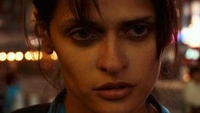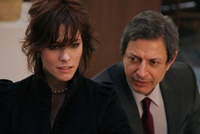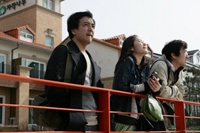2007 Philadelphia Film Festival Report
by dave heaton, jill goodheart
In late April the 2007 Philadelphia Film Festival showed a wide selection of films, many but not all of them hitting theatres for proper release sometime this year. There's somewhat of an anything-goes approach to the film selection, it seems, with films that aimed for lowest-common-denominator crowd-pleasing shown next to more esoteric or challenging films. At times the festival had a definite tilt towards international horror/action films; most of the late-evening showings were part of the "Danger After Dark" series. Building the right schedule, around the responsibilities of daily life, was somewhat of a struggle this year, but we still saw a handful of films – some gems, some decidedly not. They're organized alphabetically below:
Comedy of Power

Claude Chabrol's reputation as the heir to Hitchcock is cemented through this film, according to the festival guide. But to me there was little of Hitchcock in it, and little of the personality Chabrol's best previous films had – scarcely any intensity of mood, any serious probing of class or power issues, any memorably nefarious characters. Instead it's a meager ripped-from-the-headlines story, with Isabelle Huppert playing a judge working to expose a corporate/political scandal while her personal life gets shakier. It's an interesting set-up, but it unfolds slowly, and it slowly unfolds to nowhere that wasn't expected. There are continual hints that something unexpected will happen, but then…nothing. The film didn't strike me as misguided or filled with flaws, just dull – which can sometimes feel worse when you're sitting in the theatre. - dave heaton
Crazy Love

Dan Klores' documentary Crazy Love takes a fascinating true-life story, one that hit (mostly New York-area) newspapers a few separate times over the last several decades, and tells it in straightforward, talking-head fashion. There's nothing particularly artful about it, outside of the art of coordination involved in getting all of the principle figures to sit down for interviews. So viewer reaction will depend greatly on how familiar you are with the story of lawyer Burt Pugach and the woman of his obsession, Linda Riss. Those of us who knew nothing about their relationship, about why it made headlines, will likely find this fascinating – as I did. More fascinating than an article or book on the topic would have been? Only because I enjoy watching films, not because Klores did anything to make this documentary stand out from the crowd, outside of selecting a doozy of a story to tell. - dave heaton
Day Night Day Night

A few days after I saw Day Night Day Night I had a very real feeling of just having visited New York City. When I stopped to think, however, I realized I hadn’t been to NYC in over three months. This sensation of “being there” is eerily captured by director Julia Loktev in this film about a teenage wanna-be suicide bomber. We join the film’s protagonist (Luisa Williams)as she lands on the East Coast to perform her mission. While we only get the smallest of inklings why she left home in order to blow herself up, we closely watch every detail of her preparation for the task. Much of which is mundane: clipping toenails, washing out underwear, taking a bath, brushing teeth, even staring off in to space. Somehow, this is not boring and is even mildly suspenseful at times. Contrast these scenes with serious-but-almost-comical shots of the men running the show who appear ridiculous and not very menacing or particularly organized. On Day 2, the protagonist ends up in Times Square with $5 and a backpack full of explosives and nails. Despite her clear intention to kill dozens of innocent people, she is a sympathetic character. While we don’t want her to succeed, we don’t really want her to be a failure either. In the majority of shots, Loktev’s camera is closer in on the protagonist’s face than in a conventional film. Williams’ subtle expressions of determination, fear, and confusion are therefore magnified. And the view is brought into the scene with her; we are walking with her. And in the end, we are as lost as she is. – jill goodheart
Day Night Day Night
The title Day Night Day Night is descriptive – that is the time period during which we live with the film’s main character, a young woman in route to committing a suicide attack in New York City. And I mean live with almost literally – this film has an uncanny way of making you experience the woman’s physical movements in a visceral way. It’s through both sound design and photography: even when she does something as mundane as clip her toenails or bathe, you feel it. But we’re not put in a suicide bomber’s shoes to drive home any particular message – more to experience the emotions of someone who has convinced herself that this is the path she is being called on to take. In a way the film evades specific details (who is doing what and why), but in another sense this film is all about the details. Director Julia Loktev studied the preparatory steps of such an attack, the stories of the participants themselves, and modeled this after reality. The film isn’t about realism –this isn’t a story of “this could happen here” – but it captures realistic feelings and questions in an incredibly direct, powerful, physical way. - dave heaton
Fay Grim

In an Erasing Clouds interview and elsewhere, Hal Hartley described his previous film The Girl From Monday as “fake sci-fi”. In that same way Fay Grim is a fake political-intrigue thriller, a fake Tom Clancy film. It takes that form – with its constant series of double-crossings and potential political/governmental crimes – and adopts it to Hartley’s satiric, literary style in a loose, playful way. With Parker Posey’s title character at the front of the pack, the characters from Henry Fool and some others (including Jeff Goldblum, who fits into this milieu seamlessly for a ‘Hollywood star’) are run through a funny, but underneath not so funny, series of adventures in our post-9/11 world. Henry Fool himself serves as a Zelig-type cipher through which the “war on terror” can be viewed. Hartley’s writing is as sharp and witty as ever, as the whole madcap affair gets continually faster and messier, appropriate for the era. - dave heaton
Hula Girls

Hula Girls is the story of a chilly Japanese mining town which, to combat the town’s declining economy, decides to open up a Polynesian center, complete with palm trees and – you guessed it – girls who dance the hula. In many ways Hula Girls is not a revelation in film-making or story-telling. It has several of the components of a certain genre of formulaic feel-good movie : isolated small town down on its luck full of individuals unwilling to change, a well-meaning character with a zany idea for turning the town around, an unaccepted outsider from the big city with demons of her own, resistance, perseverance, montages evidencing this perseverance, a town slowing turning around, a fairly predictable ending. These components are likely the reason the woman who introduced this film at the Philadelphia Film Festival called it a “guilty pleasure. Despite its “guilty pleasure” status, Hula Girls in some ways transcends this moniker. Unlike those formulaic American films, this film does not dress up or romanticize poverty. There are a few unpredictable if minor plot turns within the film which help showcase the dire conditions of the town’s inhabitants and the dancers drive to succeed. And you really can’t fault the film’s “zany idea” of bringing the tropics to an apparently very cold part of Japan. It is, afterall, based on a true story. And once the girls get run through the mill by their families, their dancing instructor, and the public, there’s a lot of fun-to-watch dancing as the result. - jill goodheart
The Little Things

To call The Little Things a low-budget film would be to understate the obvious – you can see the unspent dollars in every shot. But that shaky-camera, bad-lighting approach suits the subject matter to a degree, as the story is told in a "here are some people and you probably know others like them" style. Those people are, essentially, late-20-somethings who aren't quite sure what they're doing with their lives. There's a group of teachers who go out drinking more often than not, and the photographer, assigned to take pictures of the school, who falls in with this crowd, and in maybe-love with the lead character, despite both having significant others. It's the secondary characters, the significant others and the other teachers, who seem most intriguing, have the funniest lines and most touching moments. The lead couple is likable enough for a while, but it's their irrational and narcissistic qualities that grow the most as the story unfolds. Those qualities may be part of director Stephen Padilla's point, though - in the post-screening Q&A he threw around the word "kidults", for adults who still behave like kids (and the elementary-school setting is wielded strongly as a symbol in that regard). But those supposed sociological, generational concerns are mostly outside the frame – most viewers will experience this as a mediocre romantic comedy. More irritating was Padilla's bragging post-screening that unsophisticated viewers in Kansas didn't like his ambiguous ending – they wanted to know what happens to the potential couple. The director's anti-Midwest bias annoyed me less than the fact that he didn't appear to understand his own film. The ending isn't ambiguous at all – an unnecessary, lame coda makes it all too clear what happens. - dave heaton
Once

John Carney’s Dublin-set slice-of-life/musical Once is populated with characters who communicate their feelings best through music. Not just our lead characters, a struggling street musician (Glen Hansard of The Frames) and the Czech pianist he connects with (Marketaa Irglova), but so many memorable minor characters: the bank clerk who really wants to be a singer; the recording engineer who opens up towards the band he’s recording only after hearing their music and being blown away by it; and the people of varied ages who attend a party where the admission cost is joining in to sing old folk ballads. That party scene is a real heartstrings-puller for those of us who expend so much energy on music, who believe in its power. So too are multiple scenes where the two main characters get to know each other by playing music together, starting with a memorable performance at a piano store (it doesn’t hurt that Hansard’s songs for this film are especially strong, and charmingly heartfelt). Of course this is a romanticized version of life for struggling musicians, not that they don’t still struggle (career-wise and on a personal level). But the music itself presents such a genuinely touching thread that it’s hard to care. - dave heaton
The Woman on the Beach

This has been described on a widespread level as South Korean director Hong Sang Soo's most accessible film, and the slightly obnoxious film buff introducing the film at this showing said the same. That strikes me as an example of critics stopping at the surface level. This one doesn't have the explicitly experimental structure of previous films like Virgin Stripped Bare by Her Bachelors, but it's in other ways more mysterious and less conclusive than those previous films. In this puzzling (in both exciting and frustrating ways) and visually attractive comedy-drama, all of the characters have their own degree of self-obsession. We observe a handful of characters in relative isolation from the rest of society, at a beach resort area during the cold, empty off-season. Central at the start of the film is: a narcissistic, probably overrated director with writer's block, his trod-upon, awkward friend, and the friend's maybe (in his head, at least) girlfriend, whose attention quickly shifts to the director. Their meanderings, bickering, flirtations and miscommunications form the first half of the film (yes, this one like the others has a dual structure of sorts), before two of the characters basically disappear as the third, the film director, finds himself facing his lonely obsessions with the woman of the title, who is one of at least two actual women, depending on who's around at the time. There's plenty of unusual lesser characters along the way, their actions furthering a general mood of sadness and confusion as well as subterranean themes about the interrelatedness, or lack thereof, of the universe. - dave heaton
Copyright (c) 2007 erasing clouds |
|